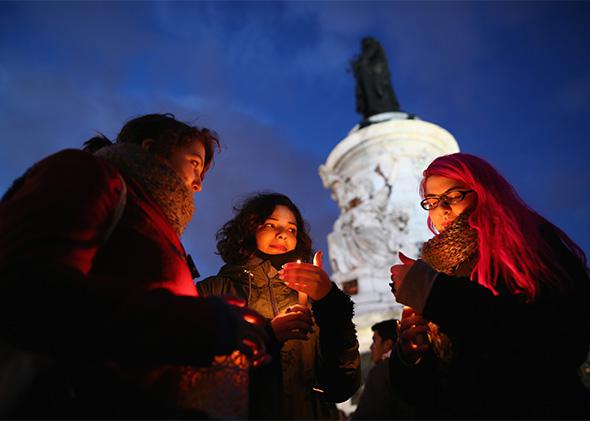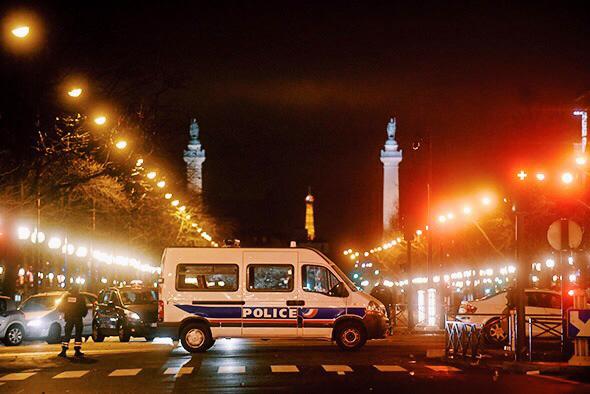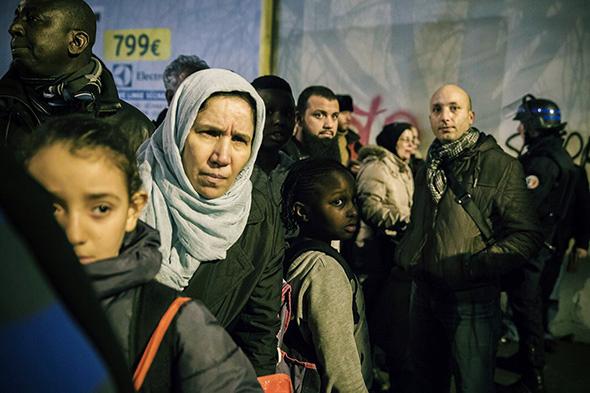For other Slate coverage of the Charlie Hebdo shootings, click here.
PARIS—On the first Wednesday of every month, France’s system of World War II-era air-raid warning sirens sounds for monthly testing at noon. It’s a startling reminder of wars past, an anachronism in peaceful modern-day Paris.
The two-tone sound of police sirens is usually a mere flourish in the ambient soundtrack of my Parisian life. But it has been blaring virtually nonstop since Wednesday, as the city has been in a state of attack and mourning and panicked suspense after the tragic and surreal chain of events that began with the massacre on Charlie Hebdo.
From my seventh-floor windows in the Marais, on a street that was laid out in 1270, I feel grounded in history and look out over an unchanging view of Paris. No billboards or skyscrapers are allowed to mar the view in my protected historic inner-city neighborhood; all I see when I look out are rooftops, chimneys, the Eiffel Tower, and Sacré-Coeur on a hill across town. But the sirens have been an inescapable reminder that what once felt like a haven from the routine gun violence that plagues other countries has turned into a war zone, with three shootings in three days and a hostage crisis that began Friday morning, escalated at lunch, and ended just before sunset.
I was on a day trip to London the day of the massacre, unaware of what had happened a mere 10-minute stroll from my apartment until I spotted a notice at the train station asking for information about the attacks.

Photo by Dan Kitwood/Getty Images
I rode through the tail end of the vigil on the Place de la République in a taxi just before midnight, my Pakistani driver comparing the day’s events to the recent massacre in his own country and repeating like a lullaby the phrase that no man had a right to take another man’s life.
The French president declared Thursday a national day of mourning, and it was. A kind of dullness descended on the city, and I caught up with teary friends and the news coverage and saw the dozens of defiant responses to the tragedy, the cartoons in homage to the fallen cartoonists, the mighty pens held aloft, the English-language message spelled out by the assembled on the Place de la République: NOT AFRAID.
But if Thursday we were sad, Friday we were afraid. When news of a second shooting and the death of a young policewoman was announced Thursday while the hunt was on for the heavily armed brothers, it was almost too much to process. Paris wasn’t burning, but it seemed to be breaking down. Was it a random act of violence, or some kind of aftershock? Was it the beginning of something, or the end?
Then Friday morning started with gunfire and a hostage taking, as the murderous Kouachi brothers holed up in a small family printing business near Charles de Gaulle airport, and at lunchtime a kosher grocery was the site of another hostage taking by Amedy Coulibaly, the gunman who killed the policewoman Thursday. It was a day in which mourning turned to panic, speculation, dread, and the kind of vague, visceral, suspenseful fear that makes it hard to breathe. We listened to the radio, stared at our screens, fielded emails from friends and relatives in other places, waited for something to break. In the late afternoon, the police ordered shops in the Jewish quarter to shut down early as a precaution. Before sunset the killers had all been killed, the remaining hostages set free while we waited for the death toll.

Photo by Antoine Antoniol/Getty Images
My editors asked me to write about what it feels like to be in Paris today, as journalists on the ground do, but I feel too emotional and bewildered to be a journalist tonight. It will take some time to sort out the events of the last few days, to try and understand what it means for France, to grapple with whatever comes next. After the Métro bombings in 1995, I learned something about Parisian grit and resilience, and the French people’s ability to intellectualize the hell out of a modern-day tragedy, putting the horrifying things that human beings do to one another into a world-weary historical context that was oddly reassuring. But it’s clear that the events of the last few days have already become a defining moment that will change the French psyche in ways that nobody yet knows. Will they fuel the already palpable tensions between certain Arabs and Jews, galvanize the anti-Islamic, ignite the xenophobic far right, polarize or unite? I will be the first to admit that I am the last one to know.
The sirens are still sounding, and while we are no longer in lockdown, the government hasn’t lifted its terror alert while Paris prepares “massive security measures” for a march in homage to the victims on Sunday, to which the French president has invited several European leaders. A few minutes ago, a press statement from Anne Hidalgo, the mayor of Paris, arrived in my inbox, summarizing the events of the day. “Tonight, Paris is once again in mourning,” Hidalgo writes. “After the odious attack against Charlie Hebdo Wednesday, today the Jewish community was targeted by terrorists who took hostages in a kosher store in the Porte de Vincennes in the 20th arrondissement. There are no words that can express the terror we all feel in the face of these barbarous and inhuman acts that touch each and every one of us.”
